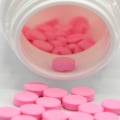Some medications related to severe liver injury include statins used to treat high cholesterol, the combination drug amoxicillin-clavulanate (Augmentin), phenytoin (Dilantin, Phenytek), azathioprine (Azasan, Imuran), niacin (Niaspan), ketoconazole, certain antivirals, and anabolic steroids. Some over-the-counter (OTC) medications and supplements can also cause liver problems. Tylenol, weight-loss supplements and green tea extract have been linked to these types of problems. Next, we'll discuss 10 medications that could damage your liver, what symptoms you should be aware of, and what you can do to prevent liver toxicity (hepatotoxicity).
In fact, just a large dose of Tylenol can cause liver damage. This is called a Tylenol overdose and is a medical emergency that requires immediate attention. You should call the Poison Control Center at 1-800-222-1222 or go to the nearest emergency room if you suspect that you have taken too much Tylenol. Tylenol can also cause liver damage if taken too often, especially for an extended period of time.
This concern is most relevant among people who have a serious illness, alcohol use disorder, or pre-existing liver problems. Do not take more than the recommended maximum amount (4000 mg per day). Avoid drinking alcohol while taking Tylenol. Check if any of your over-the-counter or prescription pain relievers contain acetaminophen, to avoid taking it accidentally from several sources.
Keep in mind that Tylenol is also found in many over-the-counter cold and flu products. Amiodarone (pacerone) is a medication used to treat abnormal heart rhythms. Increases in LFTs occur in up to 50% of people who take amiodarone long-term. However, this usually doesn't cause serious health problems.
However, in some cases, amiodarone can cause more significant liver damage. This is estimated to affect up to 1% of people taking the medication. The FDA issued a warning box, its most serious warning about the drug, about this risk. Amiodarone-related liver damage is more common in people who take the medication at higher doses and for long periods of time.
Fortunately, this risk can be monitored. You'll likely have regular LFTs while you're taking amiodarone to make sure your treatment doesn't need to be adjusted. Anti-seizure medications top many lists as possible causes of liver damage. Phenytoin (Dilantin) is one of the most common causes of DILI and liver failure.
However, the occurrence of drug-related liver damage is still quite rare overall; it occurs in less than 1 in 1000 people who take phenytoin. Liver damage usually occurs 2 to 8 weeks after starting phenytoin treatment. Almost all cases of phenytoin hepatotoxicity occur as part of larger drug reactions that affect the entire body, such as anticonvulsant hypersensitivity syndrome (AHS), DRESS, SJS and TEN. However, most cases of this type of liver injury resolve within 1 to 2 months of stopping phenytoin therapy.
Isoniazid is an effective antibiotic for preventing and treating tuberculosis. However, it is one of the 10 drugs most likely to cause DILI in several countries. Increased LFTs may affect up to 20% of people taking isoniazid. However, only about 1% of people who take the drug experience actual liver injury.
Azathioprine may cause some types of liver damage. These range from mild, reversible increases in TFT to prolonged injuries that can occur 1 to 5 years after starting treatment with azathioprine. Azathioprine-related liver toxicity is more common in people who have received a transplant. Yes, there are some potential supplements that cause liver damage.
In fact, studies show that supplements account for up to 20% of cases of liver damage in the U.S. UU. Certain vitamins when taken long-term and in high doses, such as niacin (up to 3000 mg per day for several months). There are several medications and supplements that can cause liver damage.
Certain antibiotics, anti-seizure medications, and cancer treatments are examples that are only available by prescription. However, over-the-counter (OTC) products such as Tylenol (acetaminophen), bodybuilding supplements, and green tea extracts can also cause liver damage. What does the liver do? Francis, P. Journal of Clinical and Translational Hepatology.
National Institutes of Health Office of Dietary Supplements. Liver injury caused by dietary and herbal supplements. Drug-induced liver damage is often associated with taking too much acetaminophen, the active ingredient found in over-the-counter pain relievers and fever-reducing medications, such as Tylenol. However, other external factors can cause similar damage.
Expert hepatologists from the Froedtert & health network of the Wisconsin Medical College are well aware of the causes and treatments of drug-induced liver injury. If doctors determine that there has been an overdose of acetaminophen, they will provide you with a treatment called acetylcysteine that may help reduce liver toxicity. In other cases, doctors will diagnose drug-induced liver injury based on the exclusion of other injury diagnoses. .


